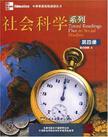中学生拓展课程系列
出版时间:2008-7 出版社:上海外教 作者:校注:曹娟//沈建平 页数:101
前言
阅读既是理解和吸收语言文化信息的重要手段之一,又是语言文化信息的最便捷的输入源。我国教育部新制定的全日制义务教育和普通高级中学《英语课程标准》对学生的阅读技能从三级到九级提出了明确的要求。在目前国内外的各种英语测试中,阅读理解所占的比重越来越大。为此,我们特向你推荐“中学英语拓展阅读丛书”(Timed ReadingsPlus)。本丛书含有以下3个子系列:社会科学(Social.Studies)、自然科学(Science)及数学(Mathematics),由上海外语教育出版社从美国McGraw Hill Glencoe公司引进出版。社会科学和自然科学各有10个分册,社会科学每册有24课,自然科学每册有25课,每课两篇阅读材料;数学有5个分册,每册有15课,每课两篇阅读材料。本丛书语言地道,知识面广,信息量大,能有效训练学生的阅读理解能力,提高他们的阅读速度。每课的第一篇阅读材料篇幅长400单词左右,侧重训练学生的快速阅读能力;阅读理解题则主要检查学生是否能在快速阅读后掌握阅读材料中的事实和材料所传达的思想。每课中的第二篇阅读材料较短,着重训练学生的阅读技巧,如:从上下文中猜测生词的含义,找出作者的观点,得出中心思想,排列事件顺序,推断作者的论点等。因此,我们认为它是一套训练学生阅读速度及阅读理解能力并能同时开拓他们视野的拓展型丛书,适合外国语学校初二及以上年级学生和非外国语学校高中学生课内、外使用。 怎样使用本系列丛书呢?我们有以下的一些阅读策略供大家参考。 1.阅读时,要集中注意力。 2.用一分钟阅读标题,并思考以下问题:我是否了解这一话题?我从这个话题中能学到什么?这个话题引起了我怎样的思考? 3.重点阅读文章第一句和最后一句,因为第一句和最后一句往往是作者提出自己观点和总结全文观点的关键句子。 4.快速阅读全文以获得材料所传达给你的信息。如遇到含有姓名、日期或数字等的内容,你应该放慢速度,以便记住这些内容。 怎样才是一个快速阅读者?
内容概要
遨游知识天地学习地道英语 你听说过环境建筑学吗?你知道转基因技术基于怎样的原理吗?我们每天点击的互联网是在哪种巧合下诞生的?欧洲中世纪城堡中一天的生活是怎样的?中国古代的造纸术分哪几个步骤?你一定想知道这些问题的答案吧。翻开这套"中学英语拓展阅读丛书",你就走进了一个五彩斑斓的奇妙世界。 《中学英语拓展阅读丛书》由外教社从美国著名出版机构麦格劳一希尔(McGraw Hill)公司引进,语言地道,知识面广,信息量大,是一套既注重培养学生英语阅读能力,又致力开阔他们视野的拓展型丛书。整套书编写理念先进,编排设计科学,难度逐级递升,既适合外国语学校及外语特色学校初二至高三年级的学生使用,也适合普通中学同等水平的学生使用。 我们期盼你在趣味盎然的阅读环境中培养阅读能力,邀游知识天地,学习地道英语。
书籍目录
致学生致老师1 A Toiling in the Textile Mills1 B Samuel Slater and the American Textile Industry2 A President Eisenhower and Progress in the 1950s2 B A Popular First Lady3 A New England Shipbuilding Past and Present3 B The USS Jimmy Carter, the Final Seawolf Submarine4 A The Caste System of India4 B The Buddha's Path5 A Working on the Transcontinental Railroad5 B Chipping Away at the Summit Tunnel6 A A Celebration of Renewal6 B Celebrating Tet in Vietnam7 A Changing Tunes for Changing Times7 B Queen of Soul8 A A Nation of Immigrants8 B Early Twentieth-Century Ports of Entry9 A The Effects of Joblessness9 B How to Obtain Unemployment Services10 A Submerged Histories10 B Excavating Underwater Artifacts11 A The Main Branches of Law11 B Wacky Laws, More than Something to Laugh About12 A Thomas Jefferson and the Declaration of Independence12 B Exploring Innovation at Monticello13 ADiego Rivera. Murals of the Great Depression13 B Kahlo and Rivera14 AMilitary Communications During World War I14 B The Great Flu Epidemic15 A The Five Themes of Geography15 B Human Beings Adapt to Their Environment16 A The Coast Guard. Always Ready16 B A Successful Search and Rescue17 A Writing a Biography17 B Catherine Drinker Bowen. Writing About Musicians18 A Climate in Sub-Saharan Africa18 B Protecting Lake Malawi19 A Vikings, Brutal Warriors or Noble Seafarers?19 B The Unique Construction of the Longship20 A Three Aspects of Chinook Society20 B A Chinook Origin Myth21 A Cattle Ranching in the West21 B The Rise of Rustlers22 A The Origins of Writing22 B The Impact of Gutenberg's Printing Method23 A The Construction of the Hoover Dam23 B Water Rights in the Colorado River Basin24 A The Public and the Mass Media 24 B An Exercise in Media Literacy附录 Answer Key Reading Rate Comprehension Score Comprehension Skills Profile
章节摘录
An immigrant is a person who comes to a new country to live. People often think of the United States as a nation of immigrants. This is because, with the exception of Native Ameri- cans, people from other countries and their descendants make up the entire U.S. population. There have been three distinct waves of immigration to the United States since the colonists founded the nation. The earliest setders were the colonists. Unlike immigrants, who come to settle in a country that is already established, colonists come to a region to found a colony under the rule of their home country. Before the founding of the United States, colonists welcomed set- tlers, from England as well as from Germany, who came to tend and settle the land. Once the colonists had founded the nation, the first wave of large-scale immigration oc- curred. Between 1820 and 1880, nearly 8 million immigrants chose to come to the country. Most of these were from Germany, England, and Ireland. They were at ease with British customs. They spoke English or a related language. Many were artisansand laborers who found work in the growing cities. On the West Coast, immigrants from China came to strike it rich in the Gold Rush and to work on the transcontinental railroad. Among those who made up the first wave were a large number of immigrants from Africa. These people were brought to the United States against their will and were sold to plantation owners to do forced labor. During the second wave of immigration——from 1880 to 1920——more than 24 million immigrants arrived. Most were from Russia, Poland, and Italy. Many were of Jewish de- scent. They brought with them a range of languages, religions, and ideas about education and government. Prior fears that immigrants would change early American values grew more intense. Immigrants were willing to work for low wages. This inspired additional fears. Citi- zens feared that immigrants would take their jobs. Laws were passed to limit the number and kinds of immigrants to enter each year. The third wave of immigration in the United States spoons (持续) the period from 1970 to the present. More than a million immigrants arrive each year from such regions as Latin America, the Caribbean, and Asia.
图书封面
评论、评分、阅读与下载
用户评论 (总计1条)
- 总想凑齐一整套。但是不太可能了
推荐图书
- 线性代数
- 中外民间故事
- 一千零一夜
- 动物产品安全生产与卫生学
- 小学生课外阅读必读丛书1
- 学习与评价课课练
- 现代企业经营管理
- 电子商务基础
- 物流管理基础与实务
- 畜产品质量安全与生产技术
- 有机化学学习指导
- 药用植物病虫害防治
- 美人茶饮
- 美人食材
- 北大绿卡·新课标教材课时同步讲练
- 北大绿卡新课标教材课时同步讲练:高中地理(必修2)(湖南教育版)
- 北大绿卡新课标教材课时同步讲练:高中地理(必修3)(湖南教育版)
- 北大绿卡新课标教材课时同步讲练:高中语文(必修5)(江苏教育版)
- 北大绿卡:高中思想政治(必修4)(人教版新课标教材课时同步讲练) (平装)
- 植物雄性不育机理研究
- 平安农机知识手册 (平装)
- 犬猫眼科学彩色图谱
- 金银岛
- 雾都孤儿
- 全国农作物审定品种2004(上下)
